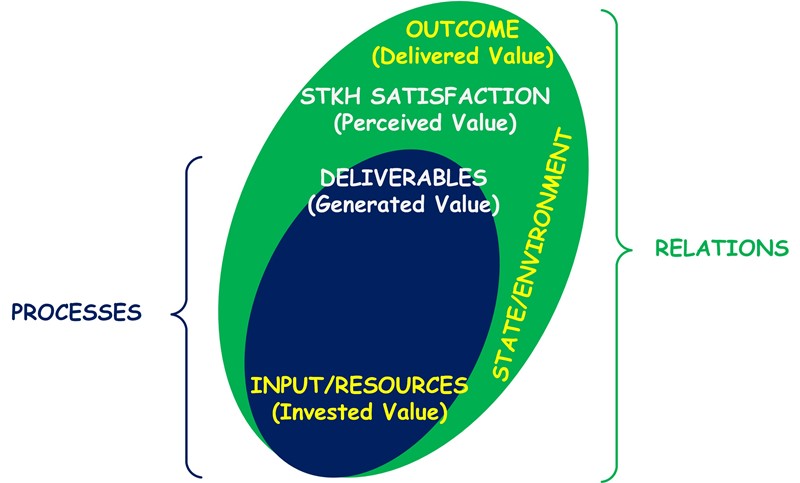A critical success factor
FEATURED PAPER
By Silvia Mari
Lugano, Switzerland
and
Massimo Pirozzi
Rome, Italy
ABSTRACT
Since the project value is created and delivered due to the stakeholder relations, an effective stakeholder engagement is basic for the project success. Indeed, from the perspective of the team, the stakeholder engagement determines the quality that is incorporated in the project, while, from the perspective of the clients and/or investors, their engagement influences basically the perceived quality and/or value. However, the stakeholder engagement is neither a natural consequence of a role nor simply the result of a positive attitude, but is a specific behavior that has to be stimulated and managed properly – and systematically! This paper gives an overview about the process of value creation and delivery and about the relevant influence of stakeholder relations, outlines the basic behaviors that are necessary to engage stakeholders, deepens how the stakeholder engagement can be effectively measured and managed via proper KPIs collected with specifically designed, tested and fielded questionnaires, shows two relevant case studies and synthetizes the systematic approach that is needed to manage effectively the stakeholder engagement.
STAKEHOLDER ENGAGEMENT TO SUPPORT VALUE CREATION AND DELIVERY
In each project, the stakeholder perspective (Pirozzi, 2017) is a basic driver to show how the value is created and delivered (Fig.1).
The outcome – which corresponds to the delivered value – is the result of the integration of the processed inputs/resources – which correspond to the invested value – with the relations, i.e. the integration of the generated value due to the deliverables with the perceived value due to the stakeholder satisfaction (Caressa and Pirozzi, 2022). Basically, the project processes are driven by the stakeholder requirements – which are generally formalized in a Statement of Work or similar – while the project relations are driven by the stakeholder expectations – which, in general, are partially unknown and/or undefined, and then require a specific stakeholder analysis.
In this scenario, in which all projects are made by stakeholders to be delivered to other stakeholders (Pirozzi, 2019), the stakeholder engagement is determinant at diverse levels.
The engagement of the “providers” – i.e. the project manager, the team, the suppliers and the eventual PMO – is in fact determinant in terms of the generated value/deliverables, since it influences directly both the individual and the integration works. In addition, there is an indirect influence on the perceived value too, because the generated value is evidently the basis of the other types of value. In general, the engagement of the project “doers” targets both efficacy and efficiency, and optimize the results at a team level, so ensuring a result in terms of the integration of deliverables that is major than the sum of the diverse results of deliverables as they are.
The engagement of the sponsors/investors – including the project sponsor and the top management – is essential to ensure the availability of the required resources over time, as well as to support their satisfaction that is fundamental for supporting properly project design, implementation, completion and follow-up.

Fig.1 – A Systemic View of a Project (Source: Caressa and Pirozzi, 2022)
The engagement of the clients is fundamental in order to define and review properly their requirements and their expectations – the satisfaction of which is always a critical success factor! –, clarifying eventual misunderstandings, preventing and/or solving eventual conflicts, harmonizing requirements and expectations and, if necessary, determining priorities. These aspects continue to be a major improvement that is needed in project management, since there are at least ten years that almost 30% of projects do not meet the original goals/business intents because of which they have been financed (Project Management Institute, 2018 and 2021), i.e. a very significant percentage of projects, on average, do not satisfy the stakeholder requirements and expectations in terms of delivered value. Definitively, the engagement with the clients is a basic support to improve the relations with them via an effective communication, and then contributes directly to a better-perceived value.
More…
To read entire paper, click here
How to cite this paper: Mari, S and Pirozzi, M (2024). Managing stakeholder engagement: A critical success factor; PM World Journal, Vol. XIII, Issue I, January. Available online at https://pmworldlibrary.net/wp-content/uploads/2024/01/pmwj137-Jan2024-Pirozzi-Mari-Managing-Stakeholder-Engagement-a-critical-success-factor.pdf
About the Authors

Silvia Mari, PhD
Lugano, Switzerland
![]()
Silvia Mari, embarked on her academic journey with a Master’s Degree in Industrial Chemistry from the University of Milan, followed by a PhD in Chemistry from Universidad Autonoma de Madrid, and a postdoc research activities at San Raffaele University Hospital of Milan. She is author of 23 publications and significant collaborations in drug optimization and metabolomics, and registered expert of the European Commission.
Her transition to project management was marked by a Certificate in Advanced Studies in Management of Biotech, Medtech & Pharma Ventures from EPFL, Lausanne, subsequently by a Certificate in Advanced Studies in Project Management from SUPSI, Lugano, and finally by PMP certification by Project Management Institute. This laid the groundwork for her pivotal role in project management, orchestrating the management of projects across international boundaries.
She is currently Senior Lecturer for the Lifelong Learning department at SUPSI in Lugano. She is member of PMI and its Swiss Chapter; and she is the treasurer of the local Project Management Association based in Lugano.
In her dynamic career spanning diverse fields and roles such as PMO and Business Agility in manufacturing industry, in compliance, regulatory affairs, and clinical support, where she streamlined operational processes and undertook project management in software development and data integrity. In her capacity as a Software Platform Project Manager, Silvia championed agile methodologies, implementing design thinking to foster innovation in software development. As an Account Manager and Product Manager, Silvia excelled in product management and personalized customer solutions. This included being the driving force behind customer training programs, showcasing her ability to bridge technical expertise with effective communication, and a core belief in the power of collaboration, adaptability, and strategic thinking.
Silvia can be contacted at mailto:mari.silvia.sciortino@gmail.com

Massimo Pirozzi
Rome, Italy
![]()
Massimo Pirozzi, MSc cum laude, Electronic Engineering, University of Rome “La Sapienza”, Project, Program and Portfolio Manager, Principal Consultant and Educator. He is a Member of the Executive Board and an Accredited Master Teacher, of the Istituto Italiano di Project Management (Italian Institute of Project Management). He is certified as a Professional Project Manager, as an Information Security Management Systems Lead Auditor, and as an International Mediator. He is a Researcher, a Lecturer, and an Author about Stakeholder Management, Relationship Management, and Complex Projects Management, and he authored or coauthored more than 5o papers in 5 different Countries. In particular, he is the Author of the innovative Book “The Stakeholder Perspective: Relationship Management to enhance Project value and Success”, CRC Press, Taylor & Francis Group, Boca Raton (FL), U.S.A., October 2019. Due to the acknowledgement of his comments on stakeholder-related issues contained in Exposure Draft of The Standard for Project Management – 7th Edition, he has been recognized as one of the Contributors and Reviewers of The PMBOK® Guide – Seventh Edition, and he received the Certificate of Appreciation for Excellence for his volunteer contributions to the Project Management Institute and the project management profession in 2020.
Massimo Pirozzi has a wide experience in managing large and complex projects, programs, and portfolios in national and international contexts, and in managing business relations with public and private organizations, including multinational companies, small and medium-sized enterprises, research institutes, and non-profit organizations. He worked successfully in several sectors, including Defense, Security, Health, Education, Engineering, Logistics, Cultural Heritage, Transport, Gaming, Services to Citizens, Consulting, and Web. He was also, for many years, a Top Manager in ICT Industry, and an Adjunct Professor in Organizational Psychology. He is registered as an Expert both of the European Commission, and of Italian Public Administrations.
Massimo Pirozzi is an Accomplished Author and an International Editorial Advisor of PM World Journal. He received three 2020 PM World Journal Editor’s Choice Awards for his featured paper “Project Management for Evidence Based Medicine” (co-authored with Dr. Lidia Strigari), for his Article “Project communications 1.0 and 2.0: from information to interactivity” and for his report from Italy titled “The fight against Coronavirus disease (COVID-19) from the perspectives of projects and of project management”. He received also two 2019 PM World Journal Editor’s Choice Awards for his featured paper “Stakeholders, Who Are They?”, and for his report from Italy titled “PM Expo® and PM Maturity Model ISIPM-Prado®”, and a 2018 PM World Journal Editor’s Choice Award for his featured paper “The Stakeholder Management Perspective to Increase the Success Rate of Complex Projects”. Massimo can be contacted at max.pirozzi@gmail.com.










[…] Effective stakeholder engagement is not just about involving stakeholders; it’s about creating and delivering project value. Proper Key Performance Indicators (KPIs) can be used to measure and manage stakeholder engagement, as discussed in an article on PM World Journal. […]